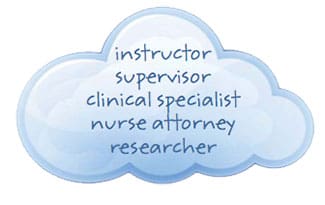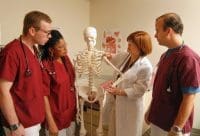A stand-out résumé, focused job search, and excellent interview skills can lead you to the job of a lifetime.
By Debra Siela, PhD, RN, CCNS, ACNS-BC, CCRN-K, CNE, RRT; Renee Twibell, PhD, RN, CNE; and Juanita Brand, EdD, RN, WHNP-BC
You’ve just reached a new milestone—your first nursing degree after completing your first nursing education program. Now you’re ready to land that
dream job. Sounds simple, doesn’t it? You know a great job is out there, available and waiting for you. It’s just a matter of having a strategic plan to find— and snag—it. This article describes important steps for helping you do that:
- writing your résumé
- finding job openings
- completing the job application
- sailing through the job interview.

As you pursue your dream job, you need to build a professional network of colleagues from previ- ous workplaces, peers from your nursing-degree program, nursing faculty and mentors, your college alumni association or university career center, and fellow members of professional nursing organizations. Also, you may benefit from sessions with a certified life coach who can guide you in making important career decisions and support you in designing a career map.
Putting a sparkle in your résumé
To apply for a nursing position, you’ll need to provide a current résumé. To prepare it, consider what you can offer an employer. What will make it sparkle and stand out? To help you decide what to in- clude, reflect on the following questions.
- Have you published in a nursing journal or on a professional website?
- Are you a volunteer or an offi- cer of a professional nursing organization?
- Have you been a preceptor or mentor for new orientees?
- Have you helped organize an association’s conference
- Have you been educated as a cardiopulmonary resuscitation instructor?
- Have you participated in clinical projects or quality-improvement initiatives?
- What have you accomplished outside your direct job responsibilities?
- Have you received awards?
- Do you have a list of your continuing education courses?
- How have you implemented lifelong learning?
- Can you describe your communication and problem-solving abilities?
Make sure your résumé is absolutely accurate and current. For each position you plan to apply for, adapt your résumé (including skills, competencies, and interests) as needed. Make sure to keep copies for yourself and take one with you to the interview. You also may find it helpful to prepare a portfolio that includes your résumé, completed projects, awards, reports and papers you’ve written, and samples of your committee work.
Visit livecareer.com/quintessential/how-to-write-resume and livecareer.com/quintessential/resume-mistakes for help in writing your résumé.
Finding job openings
You can find nursing job open- ings in many places and formats.
Online listings
Many nursing jobs are advertised online and in newspapers and nursing journals. Look for openings in specialties that interest you. Don’t forget to look for job descriptions posted on websites of hospitals, clinics, community health organizations, and professional nursing organizations. Also check out LinkedIn as well as job web sites like Monster (www.monster.com/jobs/search/?q=registered-nurse and Maxim Nurses (maximnurses.com/jobs/homecare/search).
On some organizations’ web- sites, you may be able to take a virtual tour and read the organiza- tion’s mission and vision statements. Learn as much as you can about the job and employer from the website. If you see a position you’re interested in, follow up with an email or phone call to the contact listed. Keep in mind that some of the most innovative nursing positions may not be in tradi- tional healthcare settings, so don’t overlook community-based opportunities.
Print newspaper and journal ads
Check out leads in job ads in your local and regional print newspapers, as well as in nursing print journals (and the online versions of these publications).
Common behavioral Interview questions
To help prepare for a behavioral job interview, learn what types of questions (or statements requesting a response) you should expect. Typically, they fall into the categories below.
Personality and temperament
- Think about the position you hold now (or perhaps one you’ve held in the past). How do you know when you’ve done a good job? Can you give an example of a time when you went above and beyond?
- Tell me about a time you were under a lot of stress at work. What was going on, and how did you get through it?
- Describe a time you saw a problem at work and took the initiative to correct it, rather than waiting for someone else to do it.
Teamwork
- Describe a situation when you worked with a difficult person. How did you deal with it?
- Tell me about a time you disagreed with your direct boss. What steps did you take to resolve it?
- We all make mistakes we wish we could take back. Can you describe a time you wish you’d handled a situation with a colleague differently?
Communication
- Think about a time when trust was broken in a work relationship or your commu- nication was misunderstood. State briefly what happened. What specific thoughts did you have and what actions did you take?
Clinical skills
- When you’re working with a large number of patients, delivering excellent care to them all can be tricky. How do you go about prioritizing your patients’ needs?
- Tell me about a time your clinical assessment and actions benefited a patient or the patient’s family.
- Describe a lesson you learned recently from a clinical situation that didn’t go well.
- Tell me about a time you delegated effectively
Newsletters and bulletin boards
Before starting an external search, look at openings posted in your organization’s employee newsletters and human resources bulletin boards (unless, of course, you want to change employers).
Job fairs and conferences
At job fairs and conferences, you can meet healthcare employers and network with other job seekers. Sponsored by hospitals, medical centers, universities, and nursing publications, these events typically are advertised online, in newspapers, and through profes- sional organizations and journals. Review the list of exhibitors and checkmark those you plan to visit during the event.
Be sure to take copies of your résumé to pass out. Wear profes- sional business attire and present
yourself as a compassionate, caring, competent nursing professional. Keep in mind that you may be interviewed at the event, so be prepared and give yourself time for interviews.
Focus on your preferred jobs
Once you’ve found job openings, you may have trouble narrowing down your options. Choose only five job openings before starting the next step—submitting your job application.
If you’re beginning a new nursing role, consider how a potential job could affect your professional growth. Using your networking skills, try to speak with currently employed nurses at your unit of interest in that workplace. Until you get more experience in the new job, be prepared to accept a work schedule that may not seem ideal.
Completing the job application
Once you decide to apply for a po- sition, you’ll need to complete an application. You may be able to complete it online and submit it electronically. Otherwise, you may have to travel to the site to fill it out.
Regardless of how you submit it, expect to list your contact information, type of nursing license(s) with the state, license number with expiration date, educational background with attendance dates, and degrees earned. You’ll also need to provide your employment history, with the address, telephone number, job title, and job duties for each employer.
Usually, you’ll be asked for at least one professional reference and perhaps also a personal refer- ence. Former clinical instructors or faculty can be good choices for professional references; just be sure to get permission from every- one you list as a reference. You’ll probably need to give phone num- bers or email addresses for them so the hiring manager can contact them. They may need to submit their comments about you through a weblink or phone call.
Preparing for—and sailing through—the interview
Once you land an interview, start preparing for it well ahead of time. Preparation can energize you, boost your confidence, and turn that confidence into a positive performance. Anticipate the types of questions you’ll be asked and practice your answers. Consider having friends ask you interview questions to practice. Be prepared for the age-old question, “Why should we hire you?” by developing talking points—three bullet points relevant to the job description and the organization’s priorities, such as customer service, quality work, and interpersonal skills.
Many organizations use behavioral interviewing—a technique that elicits information about your past behavior in a specific situation, instead of having you speculate about how you’d act in a hypothetical situation. Start well ahead of time to prepare for this type of interview. (See Common behavioral interview questions.)
Job Interview Topics
During a job interview, you may be asked about these topics:
- why you’re leaving your current job
- why you want this job
- your career goals
- how you fit in with the organization’s mission and philosophy
- your strengths and weaknesses relative to the job you’re applying for
- benefits and challenges of your current job
- how well you handle stress and conflict
- how well you solve complex nursing problems
- your ability to work as part of a team
- your interpersonal and communication skills
- why you became a nurse.
Also, be prepared to give an example of how you’ve handled interpersonal conflict
Prepare six or eight examples from your work experience that il- lustrate how you meet the employment criteria. Strive to become an effective storyteller. Without ram- bling or giving excessive details, describe the situation from your past, the action you took, and the result. Don’t lapse into hypotheticals. Instead, state what you actually did—not what you would do. Rehearse the stories aloud. Think about how you could adapt your stories to fit the questions you may be asked.
For examples of behavioral interview questions, visit:
- www.livecareer.com/quintessential/sample-behavioral
- livecareer.com/quintessential/behavioral-interviewing,
- college.usatoday.com/2015/04/ 22/30-behavioral-interview-questions- you-should-be-ready-to-answer/.
The night before your interview, get plenty of rest. On interview day, dress professionally in relatively conservative business attire. Some organizations post their dress codes online, which you should review to ensure you meet the criteria. Dressing appropriately shows you’re able to fit into the organization. Arrive earlier than the desig- nated time, and check your ap- pearance one last time. Don’t chew gum or carry a drink.
Focus your response narrowly on the specific question during the interview.
Expect to be interviewed by more than one person—perhaps by a panel of interviewers. If you’re meeting with one interviewer, shake his or her hand, use this person’s title and surname, and introduce yourself. Make appropriate eye contact and use open body posture. Although you want to be relaxed and conversational, remember that this is a professional encounter, not coffee with a friend. Don’t offer per- sonal information about yourself or family members or ask the interviewer about personal topics.
When you answer questions, fo- cus your response narrowly on the specific question. (See Job interview topics.) Convey enthusiasm and a positive attitude. Don’t criticize former managers, faculty, or peers. If asked about the drawbacks of your present job or a previous position, answer in an upbeat way; for example, “I wish I’d had more time to work with X type of patient or an opportunity to chair a clinical practice team to enhance my leadership skills.”
Be ready with two questions to ask the interviewer when invited to do so. You might ask a manager to share his or her vision for the workplace 5 years from now, or ask why employees like to work on this unit. Frame your questions positively; don’t, for instance, ask why the last 10 employees left. If desired, explore the option of job- shadowing or meeting with nurses who would be your peers. You might also want to ask about nurse retention and work-environment issues, again framing the question positively and listening carefully to the response.
Following up after the interview
After the interview, write a brief thank-you note to everyone you met at the organization, expressing your gratitude for their time and emphasizing that you’re interested in working there (if this is true). Send the note by email or snail mail as soon as possible. Write thank-you notes even if you’ve decided you don’t want to work at that facility—simply because it’s an opportunity to brand yourself as a nursing professional.
Creating a dream-job chart
Say you’ve interviewed at three organizations—and two of them (or even all three) offer you a job. To help you decide which one to accept, create a chart that encompasses important aspects of the job and the benefits of working at each organization. Include such items such as working conditions, quality of work life, career opportunities, loan repayment and tuition reimbursement policies, orientation or residency programs, and cross-training and shift requirements. Then use the list to compare the three job offers. Your preparation and careful analysis of the pros and cons of each organization and position can help you land that dream job.
Debra Siela is a clinical nurse specialist consultant at Siela Nurse Consultants in Bluffton, Indiana, and an associate professor at Ball State University School of Nursing in Muncie, Indiana. Renee Twibell is an as- sociate professor of nursing at Ball State and a nurse researcher for IU Health Ball Memorial Hospital in Muncie. Juanita Brand is an assistant professor at Ball State.


















